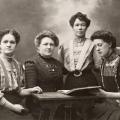Archive
2020

Seeking more European research that integrates a gender dimension
A new EU report shows how gender and sex analysis can make research better and more creative – including in disciplines that have not yet incorporated them.

Sex testing of female athletes: fair or unethical?
Female athletes with a high testosterone level are required to take hormone-reducing medication in order to participate in the women’s category. This is problematic, according to researcher Mari Haugaa Engh.

Munch and the myth of the genius
Art historian and curator Lars Toft-Eriksen explores the idea of Munch as an artistic genius and how this idea was connected to gender and expressions of gender in his time.

Covid pandemic may have caused more violence toward women
A new survey uncovers insufficient communication from the Norwegian authorities concerning support for women who are victims of domestic violence during the corona crisis.

“Pandemics affect women and men differently”
Our knowledge about previous pandemics gives us invaluable information on how to handle today’s corona pandemic, according to researchers.

Who cares for the men who are left behind?
We need more research and less scorn, and a better understanding of the incel phenomenon in order to prevent radicalisation, writes Leif Edward Ottesen Kennair

Gender equality in research is a joint European responsibility
I am hoping for more outreach and more knowledge-based debates about gender equality in research in Europe, writes Linda Marie Rustad.

Changing masculinity in Norwegian black metal
In Norwegian black metal, monstrous images of hyper-masculinity is emphasised. This has given many fans power over their own identity.

When knowledge is banned
Attacks on gender researchers’ academic freedom can have fatal consequences, according to Sunniva Folgen Høiskar and Linda Marie Rustad.

Harassing humour begins among the officers
Humour has an important function for solidarity and team spirit among conscripts in the military. According to researchers, however, it may also contribute to many women leaving the military after the compulsory military service.

Women’s travel behaviour make cities greener
Planning cities for and with women can make the city both safer and more environment friendly, according to researchers.

Updated innovation concept means greater diversity
Innovation has typically been thought of as involving patents, licences and start-ups. Today, innovation researchers have a far broader understanding of the concept, believes research leader Espen Solberg.

No discrimination against women whose CVs are as good as men’s
According to a recent study, women and men have equal chances to move up professionally in academia as a whole. There are, however, a number of systematic differences.

Research on energy is not gender neutral
"The meaning of gender perspectives in research is often reduced to just counting the number of men and women. This is a very shallow interpretation of the term. In order to create a better climate, we need to understand the people behind the energy habits," according to researcher.

Arabic women’s football: supported by the regime, but still breaking social norms
Norms and legislation strictly limit women's lives in Saudi Arabia and Qatar. Nevertheless, women find ways to realise themselves – like by playing football.
2019

“Of course Muslim feminists exist”
With her book about feminism in Islam, Marianne Hafnor Bøe not only aims to create awareness of Muslim feminists, she also wants to expand the term ‘feminism’.

“Europe wants more gender research”
Gender equality generates better results within research and innovation. In addition, EU bureaucrats argue that European research funding should be earmarked with specific requirements for gender perspectives.

Gender issues are ridiculed and sabotaged in the military
The masculine culture in the Norwegian Armed Forces is a democratic problem. This makes it difficult to work with issues related to gender, according to researcher.

Religious minority youth between patriarchy and gender equality
Gender roles is a delicate topic for religious minority groups. Many of them accept traditional gender segregation in the religious community, but struggle with prejudices from the greater society, according to researcher.

Our image of ISIS women is incomplete
The ideological conviction was often deeper among the women who joined the ISIS than among the men who did the same, according to researchers.

Research gaps in sexual violence against girls and women in sub-Saharan Africa
Sexual violence is a human rights issue and a women's health issue. Without adequate research-based knowledge, neither health services nor the justice system can offer victims the help they need.

“Women’s historical contributions are still ignored”
“Women’s history brings forth knowledge concerning one half of humanity, and makes sure that the discipline does not become gender blind,” says professor of history at University of Oslo, Hilde Sandvik.

Feminist scientists criticise gender bias in the tech industry
Whatever you find when you google depends on the people who have developed the algorithms. American researcher fears enhanced sexism and racism unless the IT sector begins to promote diversity.

Cars are still designed for men
With its research on safety for all, Volvo has a clear gender perspective on industrial innovation. So far they are quite alone in this respect.

“The urban space is sexualised and misogynistic”
“Our unconsciousness is shaped by sexist messages from advertisements. The public urban space in one of the world’s most gender equal countries is not designed for women,” according to social geographer Emma Arnold.

The EU raises the standard of Norwegian gender equality policies
That the EU affects Norwegian gender equality policies has mostly proven to be a good thing. But an individual-oriented policy puts pressure on the social democratic approach, say researchers.

Controversial documentary used to de-legitimize Norwegian gender research
Rumours that the TV show 'Brainwash' put an end to Norwegian gender research is alive and kicking in anti-feminist circles internationally.

Therapy can help men stop domestic violence
It is not given that violent men who get therapy will stop their behaviour. A decisive factor for success is that the therapist and the client have a common understanding of the problem, according to researcher Bente Lømo.

Men are more often than women fooled by placebo
It was not until the 1990s that researchers fully began to include both genders in health research. Sara Magelssen Vambheim has contributed with valuable new insights in her study of gender differences in pain experiences.

One of four LGBT people experience hate speech
A new report shows that twice as many LGBT people are victims of discrimination and exclusion as the rest of the population. The risk increases even more among those with minority characteristics.